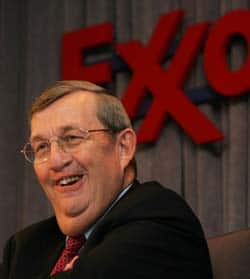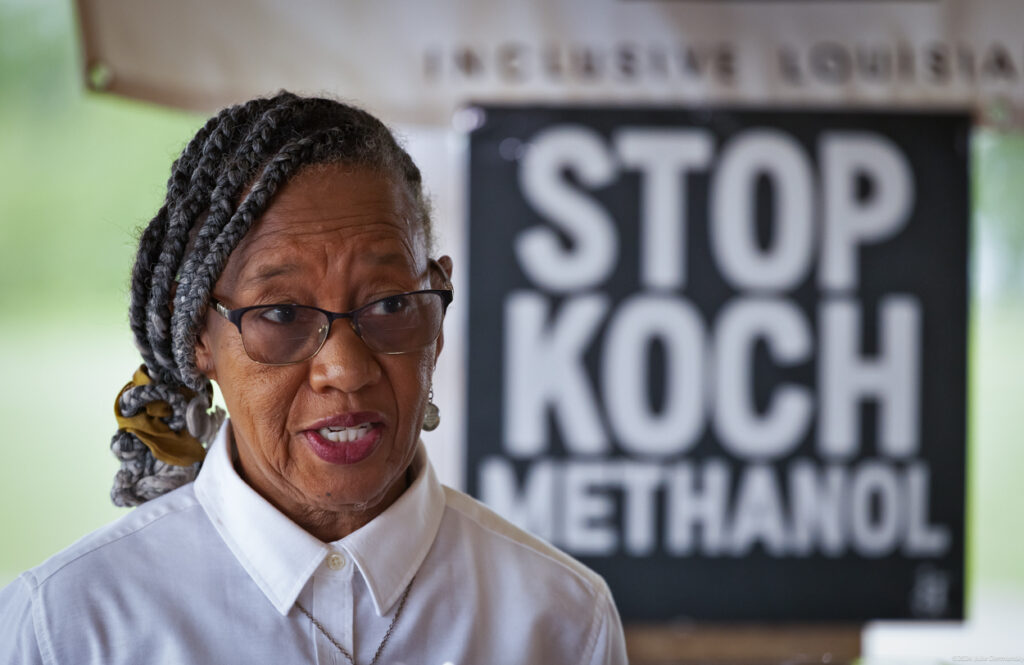This DeSmog UK epic history post portrays Lee Raymond, the Texan captain who steered the Exxon ship against the rising tide of climate science.
In 1997, BP’s British boss, John Brown, stunned the world by endorsing the science of climate change and calling for government regulation to reduce carbon emissions. Exxon’s Lee Raymond (pictured), however, was an entirely different beast: brash, bullish and brutal.
This real life J.R. Ewing came from working class stock all the way from the Great Plains and fought his way to the top of the oil giant Exxon.
Raymond lived in a 8,642-square-foot, five-bedroom brick-façade home in Dallas, had around-the-clock access to the Exxon fleet of nine corporate planes for personal and work trips, and enjoyed the protection of an armed bodyguard and chauffeur who was a former New York police officer.
‘Oil and Gas Purist’
According to Steve Coll, the author of the award-winning Private Empire: ExxonMobil and American Power, Raymond ruled the company with a “drill sergeant-inspired ethos” and he “considered himself unabashedly to be a ‘free-market capitalist’ and resisted government intervention and regulation instinctively.”
Raymond was also an “oil and gas purist” and, in taking over the company, ended the brief flirtation with environmentalism that had taken place under the former chairman Clifton Garvin, who had installed solar panels to heat his home’s swimming pool.
“It seemed the worst thing an Exxon manager could be in Raymond’s eyes was dishonest, but the second-worst thing was to be stupid,” according to one senior colleague. “‘Stupid shits’ was one of the direct phrases by which he conveyed his judgements.”
Raymond simply believed that “the scientists on the other side are wrong”. This formed the core of his speech before the Fifteenth World Petroleum Congress hosted in Beijing by the People’s Republic of China in October 1997. This took place just six months after BP’s Browne declared his conversion to the climate cause.
Fossil Fuel Development
The captain steering the Exxon ship, however, refused to see danger ahead and defiantly told the international delegates that climate change was not, in fact, taking place.
He used the speech to express his sincere concerns about the poorest in society and concerns that developing countries would be denied the opportunity to experience wealth and growth if they were not allowed to use fossil fuels unabatedly.
“Energy use and economic growth are inextricably linked,” he told the people of China. “The countries with the highest economic growth and the highest standards of living are also those with the highest energy use per capita. Today, most of that energy, both in Asia and the world as a whole comes from fossil fuels – about 85 percent.
“I know there are some people who argue that we should drastically curtail our use of fossil fuels for environmental reasons … my belief is that such proposals are neither prudent or practical … their use is essential both for economic growth and for the elimination of poverty, which is itself a worse polluter.”
Climate Science
Much of the speech was dedicated to attacking the climate science as often holding up straw men such as apparent claims of certainty about the impacts of and threat from global warming.
Raymond relied on many of the attacks first set out by the climate deniers du jour, including Fred Singer, Patrick Michaels and Richard Lindzen, along with other coal and oil-funded scientists. “Many people, politicians and public alike, believe that global warming is a rock-solid certainty, but it’s not,” he said.
He argued that changes in the climate were merely natural variability, that human-produced carbon makes only a small contribution to the greenhouse gasses in the atmosphere, and that climate models are “notoriously inaccurate”.
“The case for so called global warming is far from airtight,” he argued. “You might think that all this uncertainty would give political leaders pause. Unfortunately, it hasn’t.”
Free Market Approach
The American business leader called on China to follow “the free market approach”. He said climate mitigation would inevitably involve taxation and regulation, and “all of us would suffer from these proposals … I hope the governments of this region will work with us to resist policies that could strangle economic growth”.
The speech drew to a close with a quote from the Chinese philosopher Lao-Tzu: “Govern a great nation as you would cook a small fish – do not overdo it.”
The Beijing speech was perfectly timed to undermine the Clinton administration and its negotiating position at Kyoto. It also provided the hymn sheet for Exxon-funded sceptics to sing from during the next 20 years.
Next up, the DeSmog UK epic history series recalls the moment when leaders from around the globe agreed to limit emissions under the Kyoto Protocol.
Photo via Google Creative Commons
Subscribe to our newsletter
Stay up to date with DeSmog news and alerts






